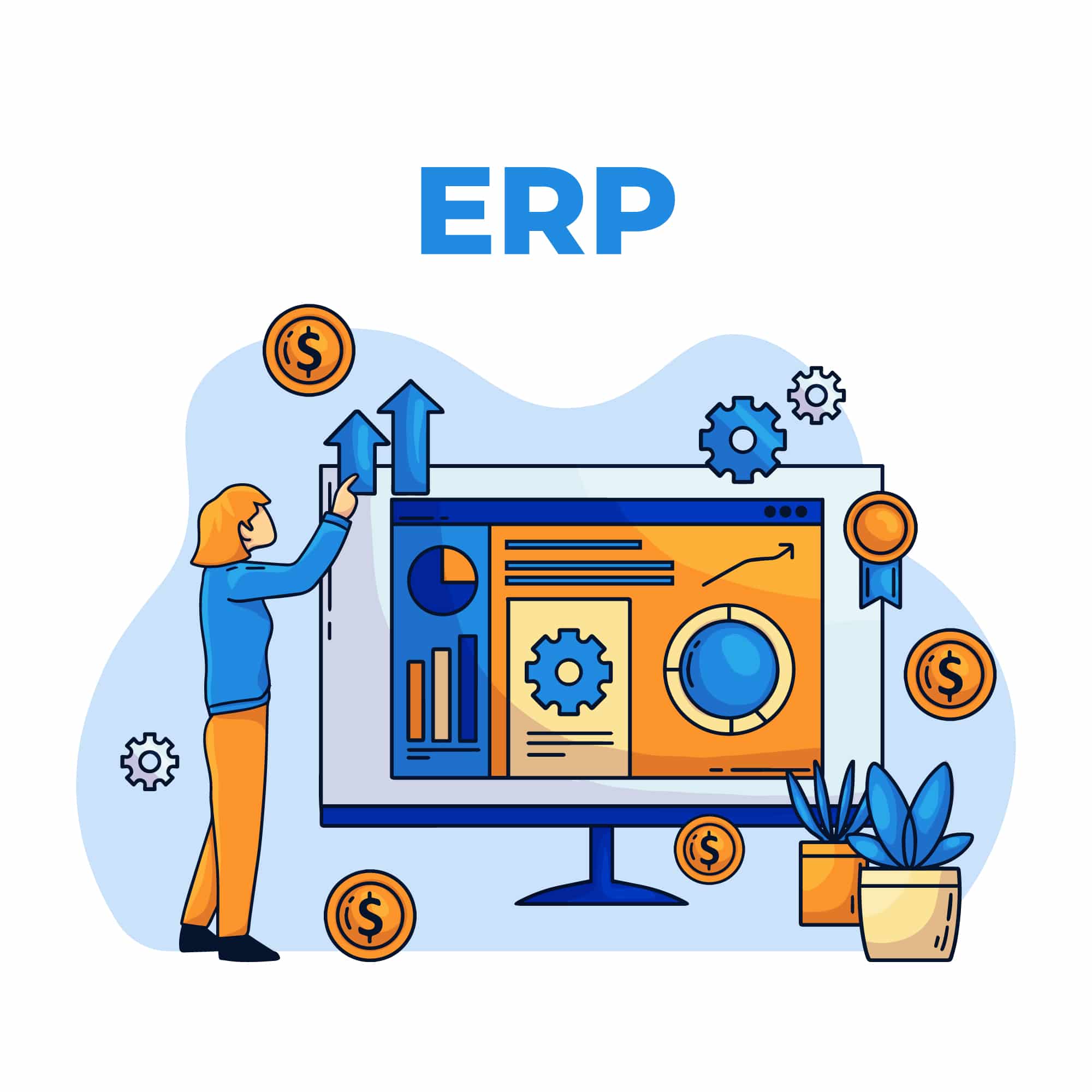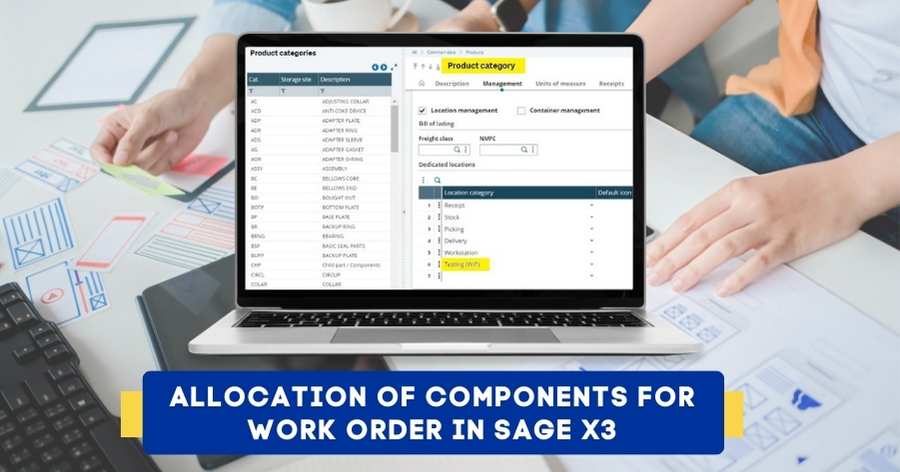Enterprise resource planning (ERP) is a software system that manages day-to-day core business processes such as finance, procurement, human resources, project management, compliance regulation, inventory control, and supply chain operations. ERP software helps you to be more cost-effective through improved efficiencies in these areas by integrating them in real-time.
ERP systems enable enterprises of all sizes, from small start-ups to massive organizations, to overcome their daily business management challenges. When traditional business practices no longer support growing demand and require a better business tool, implementing efficient ERP software becomes necessary to run a business smoothly.
Importance of ERP Systems:
The importance of ERP technology for enterprises can be understood from its growing demand. According to Fortune Business Insights, the global Enterprise Resource Planning software market is projected to grow from $49.28 billion in 2022 to $90.63 billion by 2029 at a CAGR of 9.1%.
An ERP system automates and streamlines all your core business functions helping employees in your company to get more output with fewer resources available.
You May Also Like:- What Is At The Heart Of Any ERP System?
How can an ERP Solution help improve your Business productivity?
ERP Software is crucial in enhancing all business functions and increasing employee efficiency, resulting in improved overall business performance.
Here are some of the features by which an ERP improves Business productivity:
-
Simplified Business Accounting:
Financial accounting and generating reports consume a lot of time and effort for the employees. Enterprises will find it difficult if the business accounting is done manually. Moreover, if departments like finance, sales, accounting and human resource do not have access to the same shared data, it would be impossible for a company to sustain itself.
An ERP software integrates these departments, ensuring employees work on the same data. By using ERP solutions, accounting tasks get simplified and accomplished in less time with more accuracy, helping to uplift productivity growth and reduce delays.
-
Access to Real-time information:
ERP systems enable you to get real-time information across all the different business departments like sales, production, inventory, finance, etc. You can make critical decisions based on the live data available. This means that you can respond quickly to operational challenges to reduce their impact.
In ERP, as there is an integration of all business functions, there is no need to manually enter and update the exact data for different departments every time, reducing the chances of errors.
Data visualizations in ERP software available on dashboards give an immediate insight into business activities and their performance.
-
Money and Time Saved:
ERP systems allow the user to utilize his time more efficiently. It provides the automation of repetitive and time-consuming processes across all business departments. As it is a centralized system, users don’t need to search across multiple systems to retrieve the required business data. It eliminates the need to train other users for each separate tool. Thus, it not only helps reduce the amount spent on training but also reduces the manual work, labour and time required to accomplish any business process.
This automatically enhances overall productivity.
-
Better supply chain management:
ERP software help streamline supply chain management by storing data and tracking products throughout an organization’s supply chain.
Confirming a customer order automatically generates a BOM for production teams and a purchase order for the relevant vendor. This, in turn, updates production schedules and estimated delivery time. These real-time updates help increase business visibility and resilience.
Thus, the ability to streamline the supply chain help in the on-time delivery of the products to customers at a lower cost, improving profitability.
-
Decision making & Forecasting:
ERP software has tools that help draw reports from all departments allowing your business to respond quickly. Accurate real-time reports enable team members to make informed decisions and plan efficient strategies that help to improve productivity.
ERP implementation helps businesses with several accurate forecasting capabilities.
Most enterprise resource planning Systems help in financial forecasting by providing accurate financial data for your business in real-time. This enables the finance department to monitor income and expenditures properly. It delivers inventory forecasting by providing real-time updates on stock levels. It also helps with demand and supply forecasting by estimating the likely demands of customers, products and seasons.
-
Improved Project management:
The project management tool of ERP systems plays a crucial role in improving business productivity. It helps project managers to manage every aspect of business like customers, team performance, project estimations, schedules, employees and tasks.
Centralized ERP improves efficiency by monitoring the workflow, ensuring no overlapping employee responsibilities and no confusion between teams to deliver quality results. In ERP, project management ensures that every task is accomplished on the scheduled time and there are no delays. This directly leads to improved productivity of your business.
-
Better Customer Relations:
For rapid growth, good customer relation is the primary aim of any business. ERP software can easily achieve this with its customer relationship management feature. ERP implementations enhance customer engagement by providing regular communications and related updates.
ERP software helps build customer loyalty by providing efficient after-sales service and tracking their entire journey with the company by recording their interactions since the beginning. This brings the highest levels of customer satisfaction.
-
Better Inventory Management:
Most companies can lose valuable time if they rely on manual inventory tracking. In an ERP system, inventory management enables you to keep accurate track of the stocks at warehouses, in transportation and items out of stock.
Inventory control improves productivity by giving greater visibility as warehouse managers get real-time inventory data, helping them make more accurate decisions. This level of visibility enables you to maintain the exact stock quantities required to fulfil customer demand.
-
Seamless Production Process:
ERP system can be very beneficial for manufacturing business units as it streamlines all the business processes.
ERP Solutions makes data available centrally across all business functions and easily accessible to authorized employees in real time. This enables them to make informed decisions during manufacturing processes.
Production processes are automated, eliminating redundancies and human errors. This helps to improve productivity and operational efficiency. Gives direct transfer of material required data to production and purchase departments, assuring no shortages or stopping during production.
-
Compliance Regulation:
This is one of the powerful benefits of an ERP system. Most ERP systems are designed in such a way that they help industries to keep track of business regulations. This enables businesses to stay updated and in compliance with government laws.
-
Risk Management:
There is no such project which is entirely risk-free. A project exists to bring about change, and with change comes uncertainty, which means risks have to be taken. Therefore, avoiding trouble in a project is not an option – instead, the focus must be on managing risk. Risk management involves the identification and evaluation of risk along with the identification and selection of appropriate responses for it.
Risk management is often thought of as the avoidance of negative outcomes, but it’s clear that for an ERP implementation to be described as a success, there must also be positive outcomes.
Also Read:- TOP 10 ERP Modules: The Complete List (2023)
Conclusion/Summary:
Implementing Enterprise Resource Planning (ERP) Software helps you manage and integrate all business processes enhancing your entire business productivity. With a better line of sight, companies can better plan and allocate resources. Businesses can’t function smoothly without an ERP system, as each department uses its own disconnected system.
Sage Software Solutions is a leading IT company with an array of advanced ERP Software solutions. Our proprietary products — Sage X3 and Sage 300, will help you cut operational expenses, improve business productivity, increase operational efficiency, forge robust customer relationships, and strengthen associations with vendors, suppliers, and distributors. So, if you are looking to reinforce your business fundamentals and emerge as an industry leader, then please schedule a call with one of our sales representatives.





